Professional Development: Analyzing the Tourism Sector Career Path
VerifiedAdded on 2023/01/05
|9
|1881
|24
Report
AI Summary
This report provides a comprehensive analysis of the tourism sector, focusing on career planning and professional development. It begins with an introduction highlighting the report's objectives, which include examining current trends, required skills, and job opportunities within the tourism industry. The report then delves into a detailed self-assessment process, emphasizing the importance of understanding one's interests, strengths, and areas for improvement. It also covers labor market research and building a job search toolkit. The report identifies key trends impacting the tourism sector, such as voice search and monitoring, digital technology, leisure travel, and eco-travel. It outlines essential skills for success, including networking and continuous skill development. The report concludes with an evaluation section, including survey questions, to gauge the respondents' interest in travel jobs and their understanding of tourism trends. The report incorporates various references to support its findings, providing a solid foundation for understanding the tourism industry's career prospects.

Career viewpoint
Paraphrase This Document
Need a fresh take? Get an instant paraphrase of this document with our AI Paraphraser
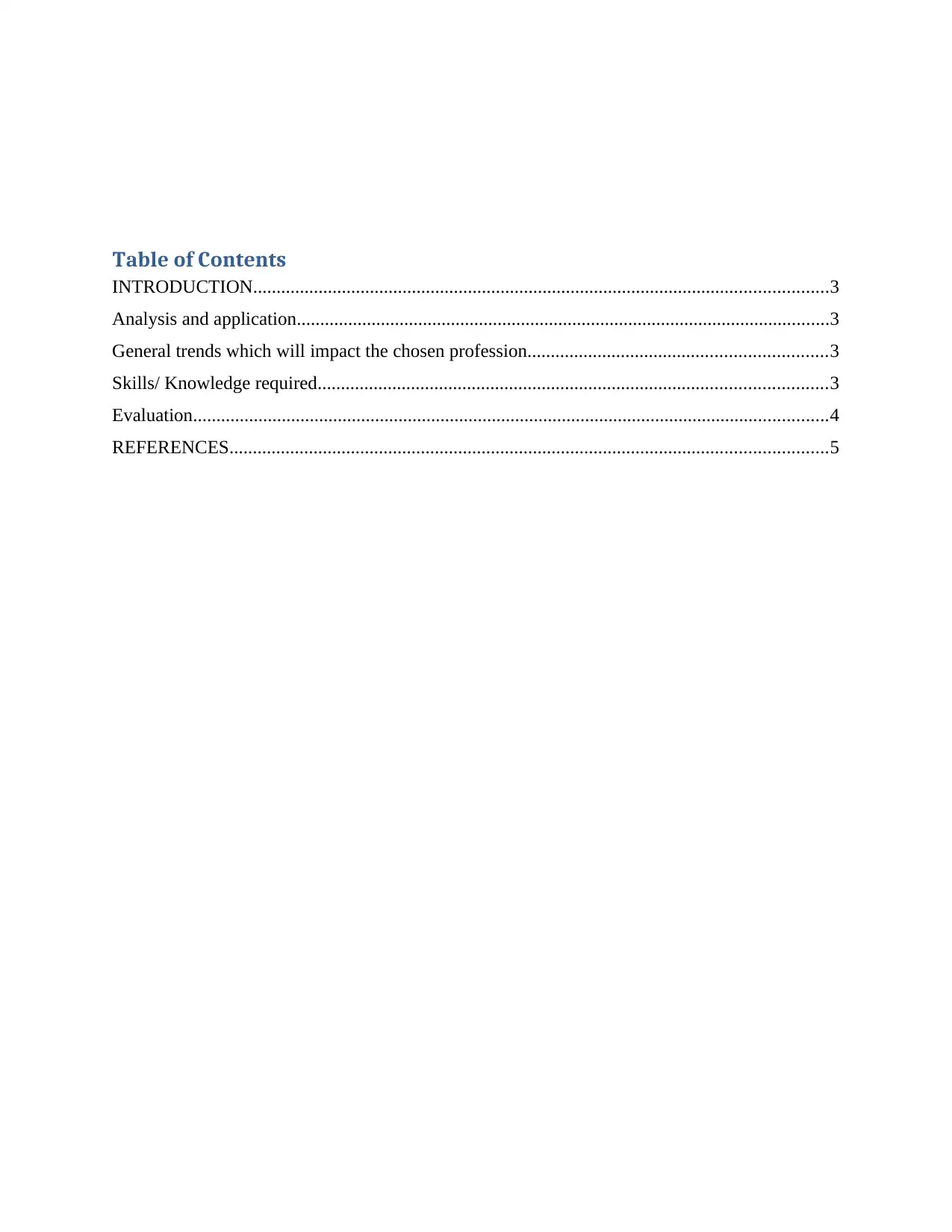
Table of Contents
INTRODUCTION...........................................................................................................................3
Analysis and application..................................................................................................................3
General trends which will impact the chosen profession................................................................3
Skills/ Knowledge required.............................................................................................................3
Evaluation........................................................................................................................................4
REFERENCES................................................................................................................................5
INTRODUCTION...........................................................................................................................3
Analysis and application..................................................................................................................3
General trends which will impact the chosen profession................................................................3
Skills/ Knowledge required.............................................................................................................3
Evaluation........................................................................................................................................4
REFERENCES................................................................................................................................5
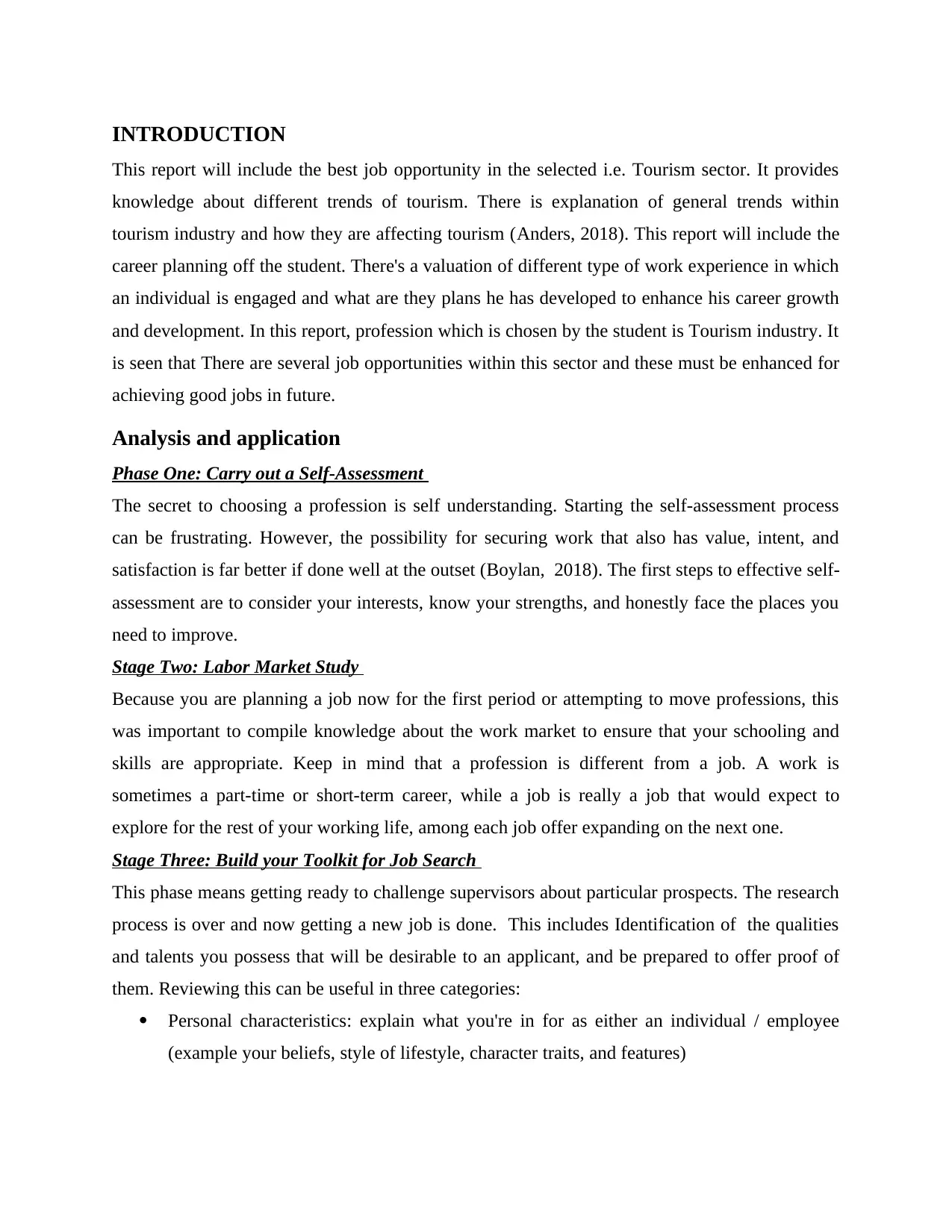
INTRODUCTION
This report will include the best job opportunity in the selected i.e. Tourism sector. It provides
knowledge about different trends of tourism. There is explanation of general trends within
tourism industry and how they are affecting tourism (Anders, 2018). This report will include the
career planning off the student. There's a valuation of different type of work experience in which
an individual is engaged and what are they plans he has developed to enhance his career growth
and development. In this report, profession which is chosen by the student is Tourism industry. It
is seen that There are several job opportunities within this sector and these must be enhanced for
achieving good jobs in future.
Analysis and application
Phase One: Carry out a Self-Assessment
The secret to choosing a profession is self understanding. Starting the self-assessment process
can be frustrating. However, the possibility for securing work that also has value, intent, and
satisfaction is far better if done well at the outset (Boylan, 2018). The first steps to effective self-
assessment are to consider your interests, know your strengths, and honestly face the places you
need to improve.
Stage Two: Labor Market Study
Because you are planning a job now for the first period or attempting to move professions, this
was important to compile knowledge about the work market to ensure that your schooling and
skills are appropriate. Keep in mind that a profession is different from a job. A work is
sometimes a part-time or short-term career, while a job is really a job that would expect to
explore for the rest of your working life, among each job offer expanding on the next one.
Stage Three: Build your Toolkit for Job Search
This phase means getting ready to challenge supervisors about particular prospects. The research
process is over and now getting a new job is done. This includes Identification of the qualities
and talents you possess that will be desirable to an applicant, and be prepared to offer proof of
them. Reviewing this can be useful in three categories:
Personal characteristics: explain what you're in for as either an individual / employee
(example your beliefs, style of lifestyle, character traits, and features)
This report will include the best job opportunity in the selected i.e. Tourism sector. It provides
knowledge about different trends of tourism. There is explanation of general trends within
tourism industry and how they are affecting tourism (Anders, 2018). This report will include the
career planning off the student. There's a valuation of different type of work experience in which
an individual is engaged and what are they plans he has developed to enhance his career growth
and development. In this report, profession which is chosen by the student is Tourism industry. It
is seen that There are several job opportunities within this sector and these must be enhanced for
achieving good jobs in future.
Analysis and application
Phase One: Carry out a Self-Assessment
The secret to choosing a profession is self understanding. Starting the self-assessment process
can be frustrating. However, the possibility for securing work that also has value, intent, and
satisfaction is far better if done well at the outset (Boylan, 2018). The first steps to effective self-
assessment are to consider your interests, know your strengths, and honestly face the places you
need to improve.
Stage Two: Labor Market Study
Because you are planning a job now for the first period or attempting to move professions, this
was important to compile knowledge about the work market to ensure that your schooling and
skills are appropriate. Keep in mind that a profession is different from a job. A work is
sometimes a part-time or short-term career, while a job is really a job that would expect to
explore for the rest of your working life, among each job offer expanding on the next one.
Stage Three: Build your Toolkit for Job Search
This phase means getting ready to challenge supervisors about particular prospects. The research
process is over and now getting a new job is done. This includes Identification of the qualities
and talents you possess that will be desirable to an applicant, and be prepared to offer proof of
them. Reviewing this can be useful in three categories:
Personal characteristics: explain what you're in for as either an individual / employee
(example your beliefs, style of lifestyle, character traits, and features)
⊘ This is a preview!⊘
Do you want full access?
Subscribe today to unlock all pages.

Trusted by 1+ million students worldwide
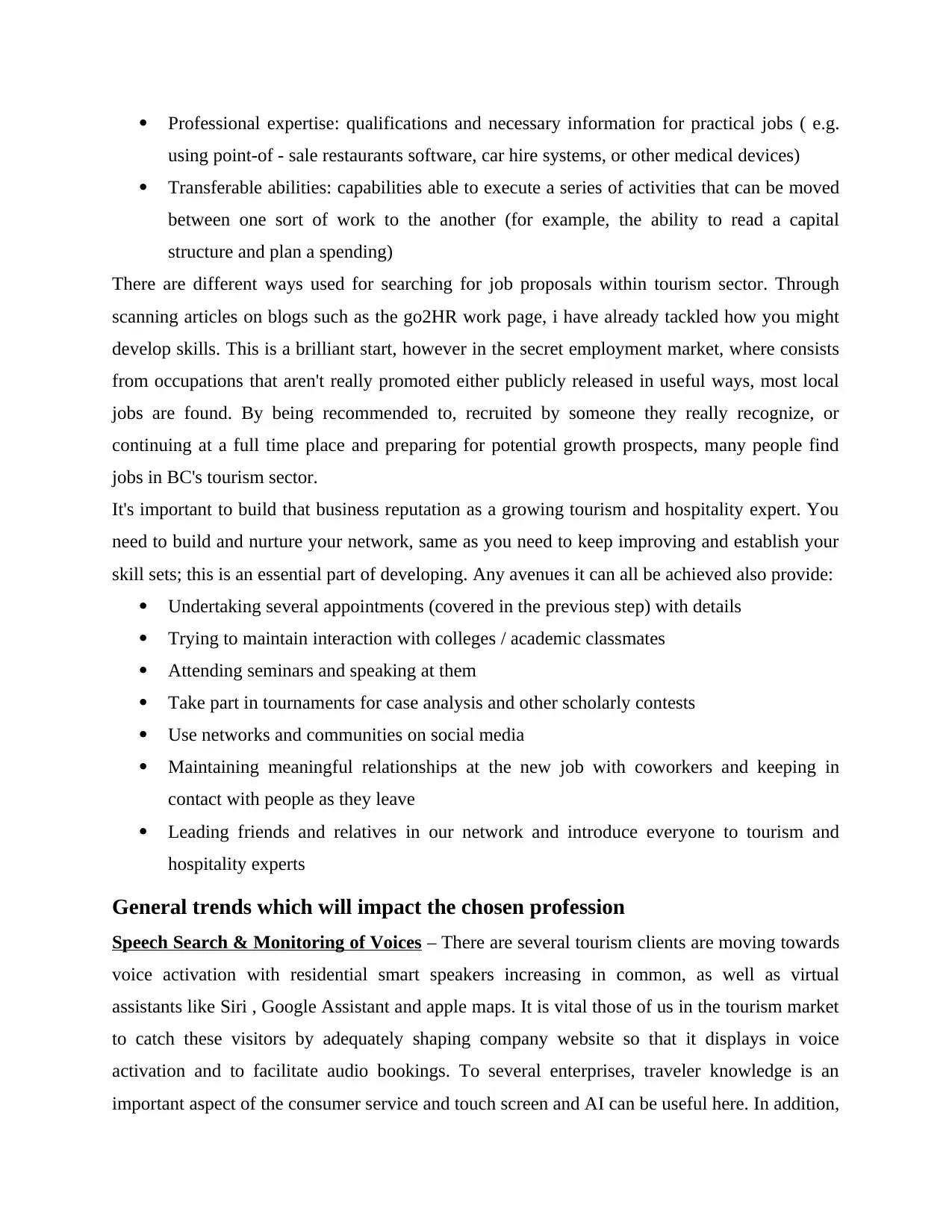
Professional expertise: qualifications and necessary information for practical jobs ( e.g.
using point-of - sale restaurants software, car hire systems, or other medical devices)
Transferable abilities: capabilities able to execute a series of activities that can be moved
between one sort of work to the another (for example, the ability to read a capital
structure and plan a spending)
There are different ways used for searching for job proposals within tourism sector. Through
scanning articles on blogs such as the go2HR work page, i have already tackled how you might
develop skills. This is a brilliant start, however in the secret employment market, where consists
from occupations that aren't really promoted either publicly released in useful ways, most local
jobs are found. By being recommended to, recruited by someone they really recognize, or
continuing at a full time place and preparing for potential growth prospects, many people find
jobs in BC's tourism sector.
It's important to build that business reputation as a growing tourism and hospitality expert. You
need to build and nurture your network, same as you need to keep improving and establish your
skill sets; this is an essential part of developing. Any avenues it can all be achieved also provide:
Undertaking several appointments (covered in the previous step) with details
Trying to maintain interaction with colleges / academic classmates
Attending seminars and speaking at them
Take part in tournaments for case analysis and other scholarly contests
Use networks and communities on social media
Maintaining meaningful relationships at the new job with coworkers and keeping in
contact with people as they leave
Leading friends and relatives in our network and introduce everyone to tourism and
hospitality experts
General trends which will impact the chosen profession
Speech Search & Monitoring of Voices – There are several tourism clients are moving towards
voice activation with residential smart speakers increasing in common, as well as virtual
assistants like Siri , Google Assistant and apple maps. It is vital those of us in the tourism market
to catch these visitors by adequately shaping company website so that it displays in voice
activation and to facilitate audio bookings. To several enterprises, traveler knowledge is an
important aspect of the consumer service and touch screen and AI can be useful here. In addition,
using point-of - sale restaurants software, car hire systems, or other medical devices)
Transferable abilities: capabilities able to execute a series of activities that can be moved
between one sort of work to the another (for example, the ability to read a capital
structure and plan a spending)
There are different ways used for searching for job proposals within tourism sector. Through
scanning articles on blogs such as the go2HR work page, i have already tackled how you might
develop skills. This is a brilliant start, however in the secret employment market, where consists
from occupations that aren't really promoted either publicly released in useful ways, most local
jobs are found. By being recommended to, recruited by someone they really recognize, or
continuing at a full time place and preparing for potential growth prospects, many people find
jobs in BC's tourism sector.
It's important to build that business reputation as a growing tourism and hospitality expert. You
need to build and nurture your network, same as you need to keep improving and establish your
skill sets; this is an essential part of developing. Any avenues it can all be achieved also provide:
Undertaking several appointments (covered in the previous step) with details
Trying to maintain interaction with colleges / academic classmates
Attending seminars and speaking at them
Take part in tournaments for case analysis and other scholarly contests
Use networks and communities on social media
Maintaining meaningful relationships at the new job with coworkers and keeping in
contact with people as they leave
Leading friends and relatives in our network and introduce everyone to tourism and
hospitality experts
General trends which will impact the chosen profession
Speech Search & Monitoring of Voices – There are several tourism clients are moving towards
voice activation with residential smart speakers increasing in common, as well as virtual
assistants like Siri , Google Assistant and apple maps. It is vital those of us in the tourism market
to catch these visitors by adequately shaping company website so that it displays in voice
activation and to facilitate audio bookings. To several enterprises, traveler knowledge is an
important aspect of the consumer service and touch screen and AI can be useful here. In addition,
Paraphrase This Document
Need a fresh take? Get an instant paraphrase of this document with our AI Paraphraser
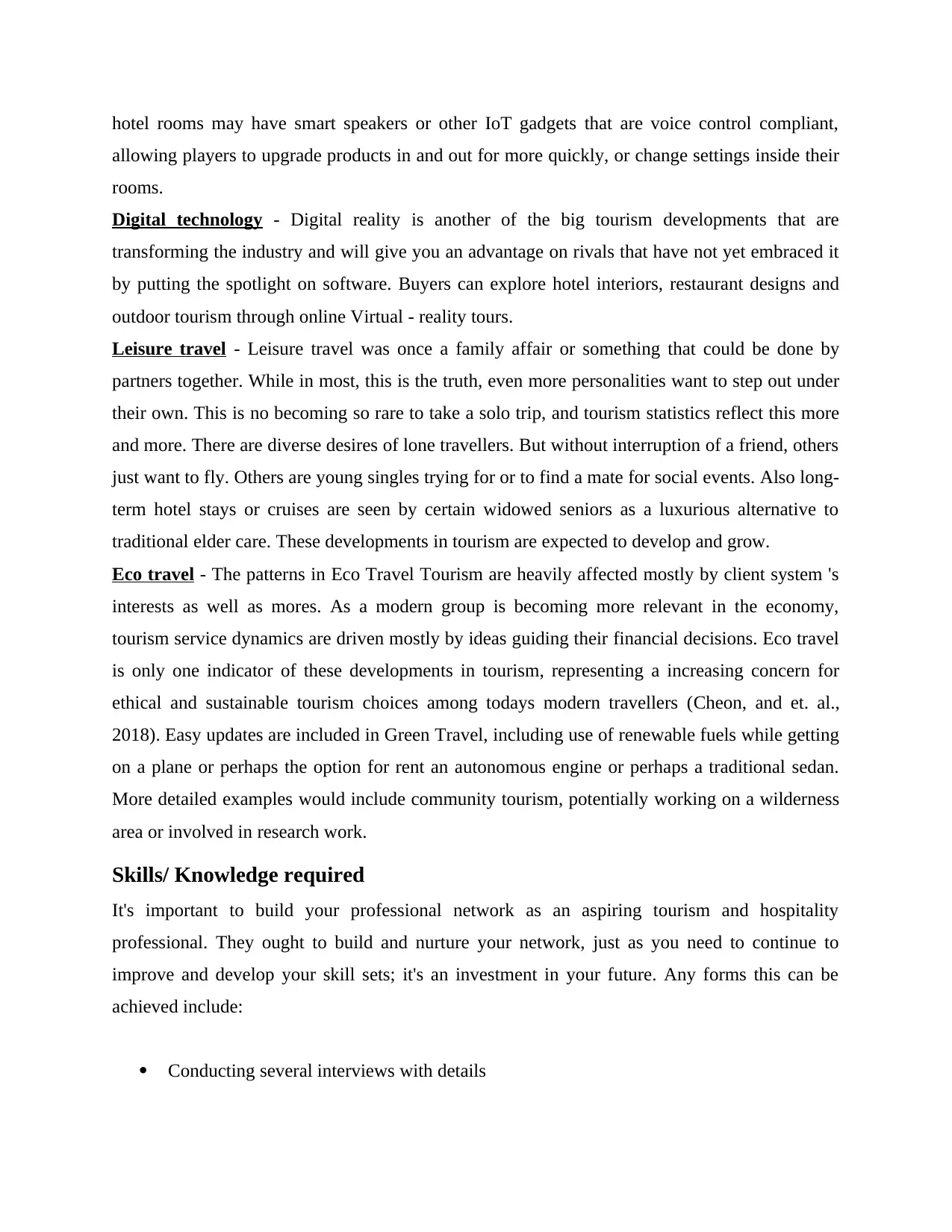
hotel rooms may have smart speakers or other IoT gadgets that are voice control compliant,
allowing players to upgrade products in and out for more quickly, or change settings inside their
rooms.
Digital technology - Digital reality is another of the big tourism developments that are
transforming the industry and will give you an advantage on rivals that have not yet embraced it
by putting the spotlight on software. Buyers can explore hotel interiors, restaurant designs and
outdoor tourism through online Virtual - reality tours.
Leisure travel - Leisure travel was once a family affair or something that could be done by
partners together. While in most, this is the truth, even more personalities want to step out under
their own. This is no becoming so rare to take a solo trip, and tourism statistics reflect this more
and more. There are diverse desires of lone travellers. But without interruption of a friend, others
just want to fly. Others are young singles trying for or to find a mate for social events. Also long-
term hotel stays or cruises are seen by certain widowed seniors as a luxurious alternative to
traditional elder care. These developments in tourism are expected to develop and grow.
Eco travel - The patterns in Eco Travel Tourism are heavily affected mostly by client system 's
interests as well as mores. As a modern group is becoming more relevant in the economy,
tourism service dynamics are driven mostly by ideas guiding their financial decisions. Eco travel
is only one indicator of these developments in tourism, representing a increasing concern for
ethical and sustainable tourism choices among todays modern travellers (Cheon, and et. al.,
2018). Easy updates are included in Green Travel, including use of renewable fuels while getting
on a plane or perhaps the option for rent an autonomous engine or perhaps a traditional sedan.
More detailed examples would include community tourism, potentially working on a wilderness
area or involved in research work.
Skills/ Knowledge required
It's important to build your professional network as an aspiring tourism and hospitality
professional. They ought to build and nurture your network, just as you need to continue to
improve and develop your skill sets; it's an investment in your future. Any forms this can be
achieved include:
Conducting several interviews with details
allowing players to upgrade products in and out for more quickly, or change settings inside their
rooms.
Digital technology - Digital reality is another of the big tourism developments that are
transforming the industry and will give you an advantage on rivals that have not yet embraced it
by putting the spotlight on software. Buyers can explore hotel interiors, restaurant designs and
outdoor tourism through online Virtual - reality tours.
Leisure travel - Leisure travel was once a family affair or something that could be done by
partners together. While in most, this is the truth, even more personalities want to step out under
their own. This is no becoming so rare to take a solo trip, and tourism statistics reflect this more
and more. There are diverse desires of lone travellers. But without interruption of a friend, others
just want to fly. Others are young singles trying for or to find a mate for social events. Also long-
term hotel stays or cruises are seen by certain widowed seniors as a luxurious alternative to
traditional elder care. These developments in tourism are expected to develop and grow.
Eco travel - The patterns in Eco Travel Tourism are heavily affected mostly by client system 's
interests as well as mores. As a modern group is becoming more relevant in the economy,
tourism service dynamics are driven mostly by ideas guiding their financial decisions. Eco travel
is only one indicator of these developments in tourism, representing a increasing concern for
ethical and sustainable tourism choices among todays modern travellers (Cheon, and et. al.,
2018). Easy updates are included in Green Travel, including use of renewable fuels while getting
on a plane or perhaps the option for rent an autonomous engine or perhaps a traditional sedan.
More detailed examples would include community tourism, potentially working on a wilderness
area or involved in research work.
Skills/ Knowledge required
It's important to build your professional network as an aspiring tourism and hospitality
professional. They ought to build and nurture your network, just as you need to continue to
improve and develop your skill sets; it's an investment in your future. Any forms this can be
achieved include:
Conducting several interviews with details
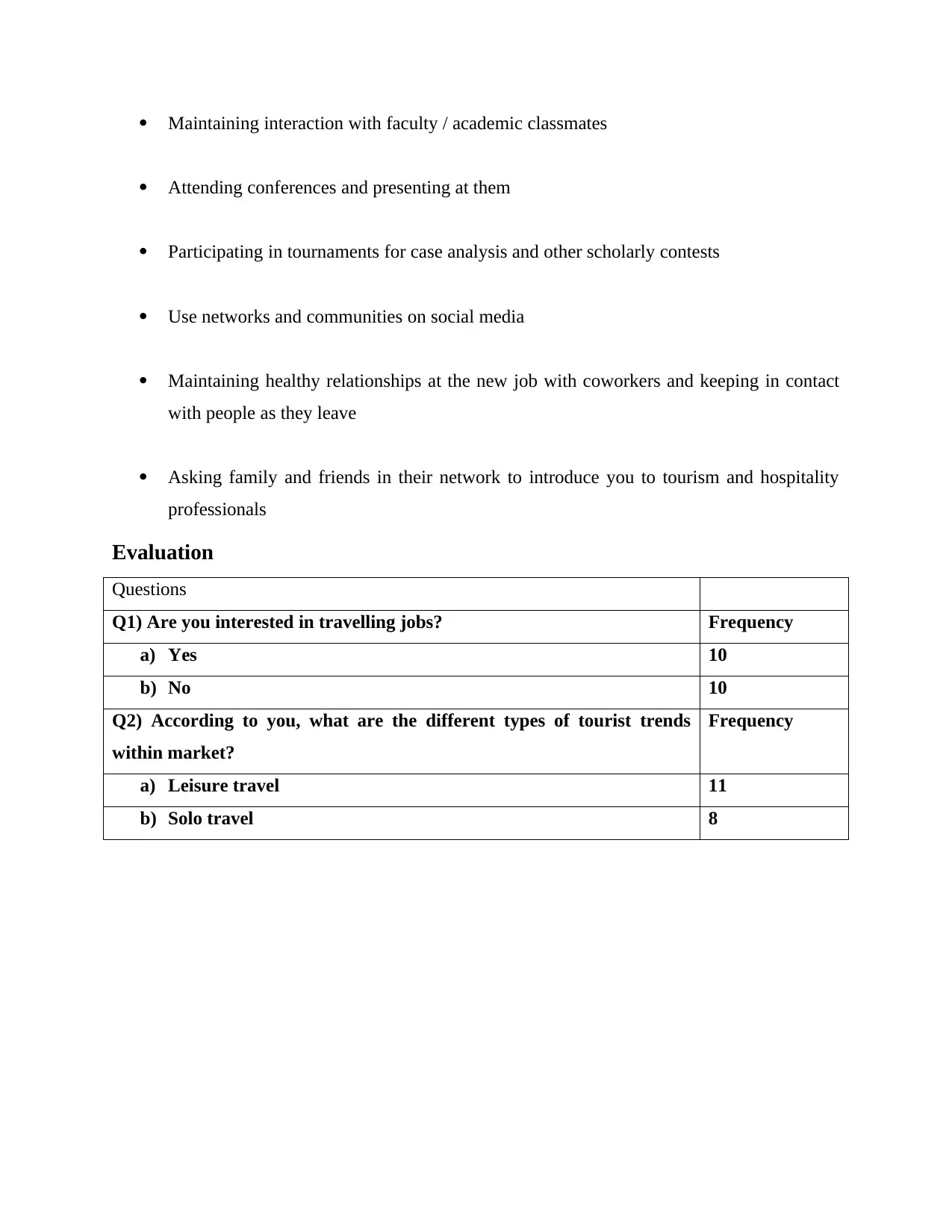
Maintaining interaction with faculty / academic classmates
Attending conferences and presenting at them
Participating in tournaments for case analysis and other scholarly contests
Use networks and communities on social media
Maintaining healthy relationships at the new job with coworkers and keeping in contact
with people as they leave
Asking family and friends in their network to introduce you to tourism and hospitality
professionals
Evaluation
Questions
Q1) Are you interested in travelling jobs? Frequency
a) Yes 10
b) No 10
Q2) According to you, what are the different types of tourist trends
within market?
Frequency
a) Leisure travel 11
b) Solo travel 8
Attending conferences and presenting at them
Participating in tournaments for case analysis and other scholarly contests
Use networks and communities on social media
Maintaining healthy relationships at the new job with coworkers and keeping in contact
with people as they leave
Asking family and friends in their network to introduce you to tourism and hospitality
professionals
Evaluation
Questions
Q1) Are you interested in travelling jobs? Frequency
a) Yes 10
b) No 10
Q2) According to you, what are the different types of tourist trends
within market?
Frequency
a) Leisure travel 11
b) Solo travel 8
⊘ This is a preview!⊘
Do you want full access?
Subscribe today to unlock all pages.

Trusted by 1+ million students worldwide
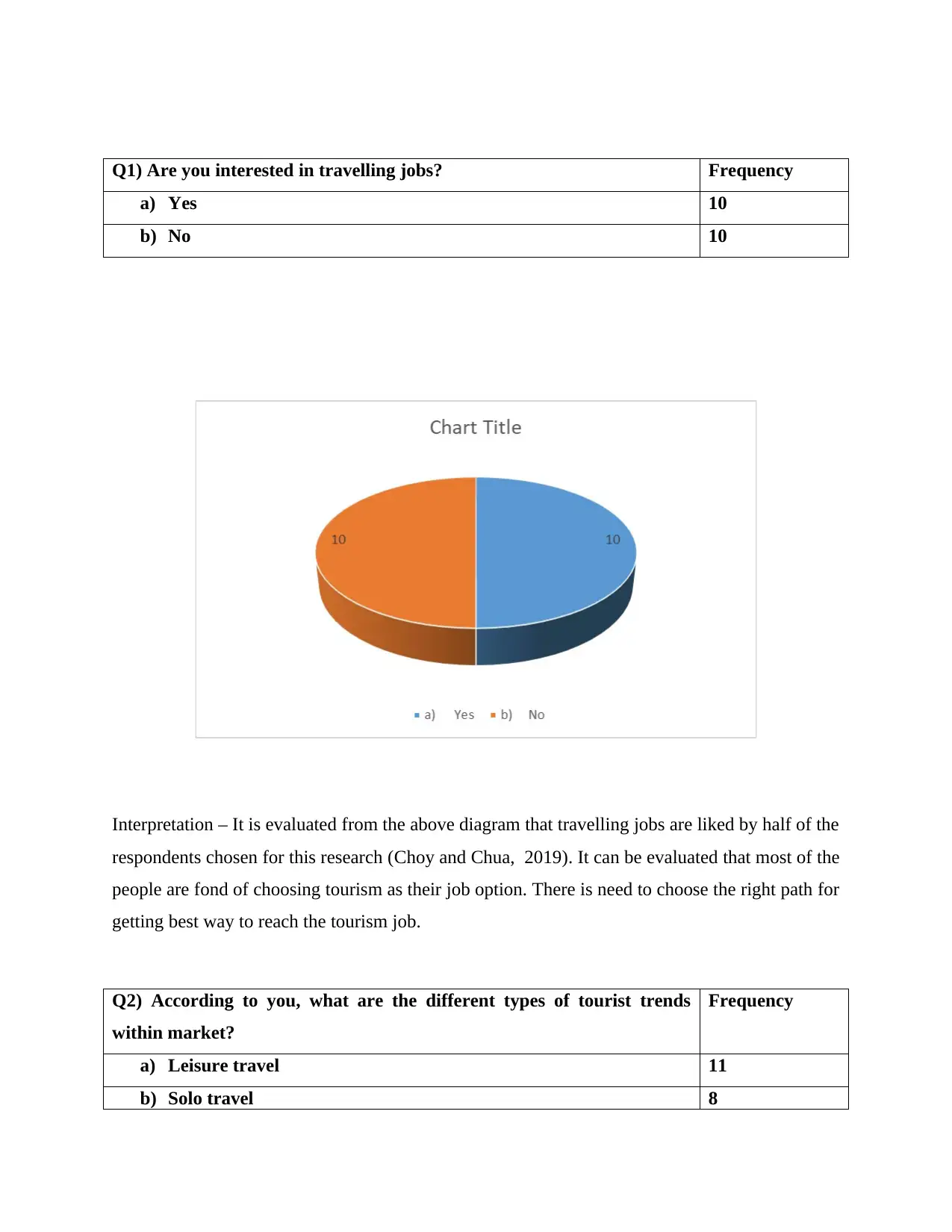
Q1) Are you interested in travelling jobs? Frequency
a) Yes 10
b) No 10
Interpretation – It is evaluated from the above diagram that travelling jobs are liked by half of the
respondents chosen for this research (Choy and Chua, 2019). It can be evaluated that most of the
people are fond of choosing tourism as their job option. There is need to choose the right path for
getting best way to reach the tourism job.
Q2) According to you, what are the different types of tourist trends
within market?
Frequency
a) Leisure travel 11
b) Solo travel 8
a) Yes 10
b) No 10
Interpretation – It is evaluated from the above diagram that travelling jobs are liked by half of the
respondents chosen for this research (Choy and Chua, 2019). It can be evaluated that most of the
people are fond of choosing tourism as their job option. There is need to choose the right path for
getting best way to reach the tourism job.
Q2) According to you, what are the different types of tourist trends
within market?
Frequency
a) Leisure travel 11
b) Solo travel 8
Paraphrase This Document
Need a fresh take? Get an instant paraphrase of this document with our AI Paraphraser
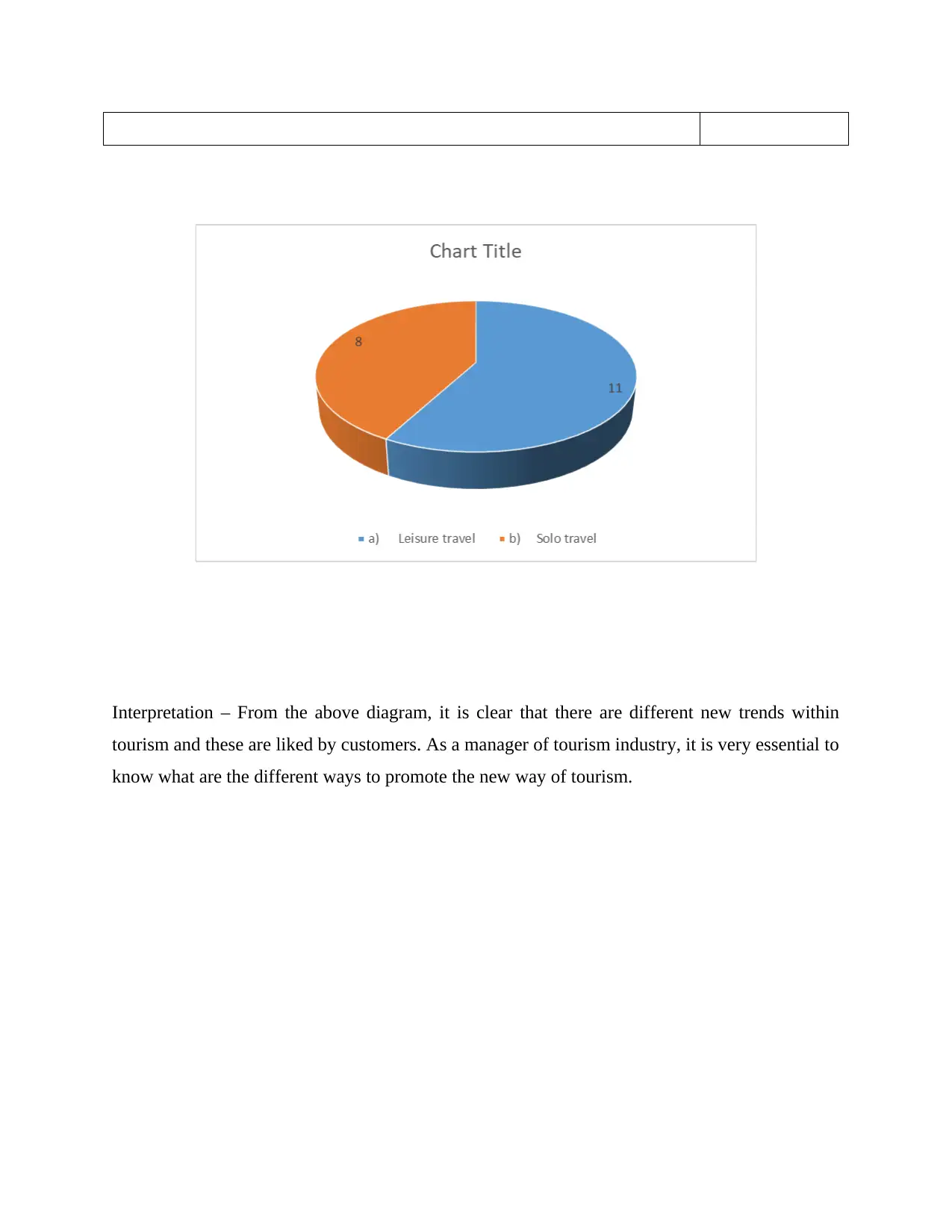
Interpretation – From the above diagram, it is clear that there are different new trends within
tourism and these are liked by customers. As a manager of tourism industry, it is very essential to
know what are the different ways to promote the new way of tourism.
tourism and these are liked by customers. As a manager of tourism industry, it is very essential to
know what are the different ways to promote the new way of tourism.
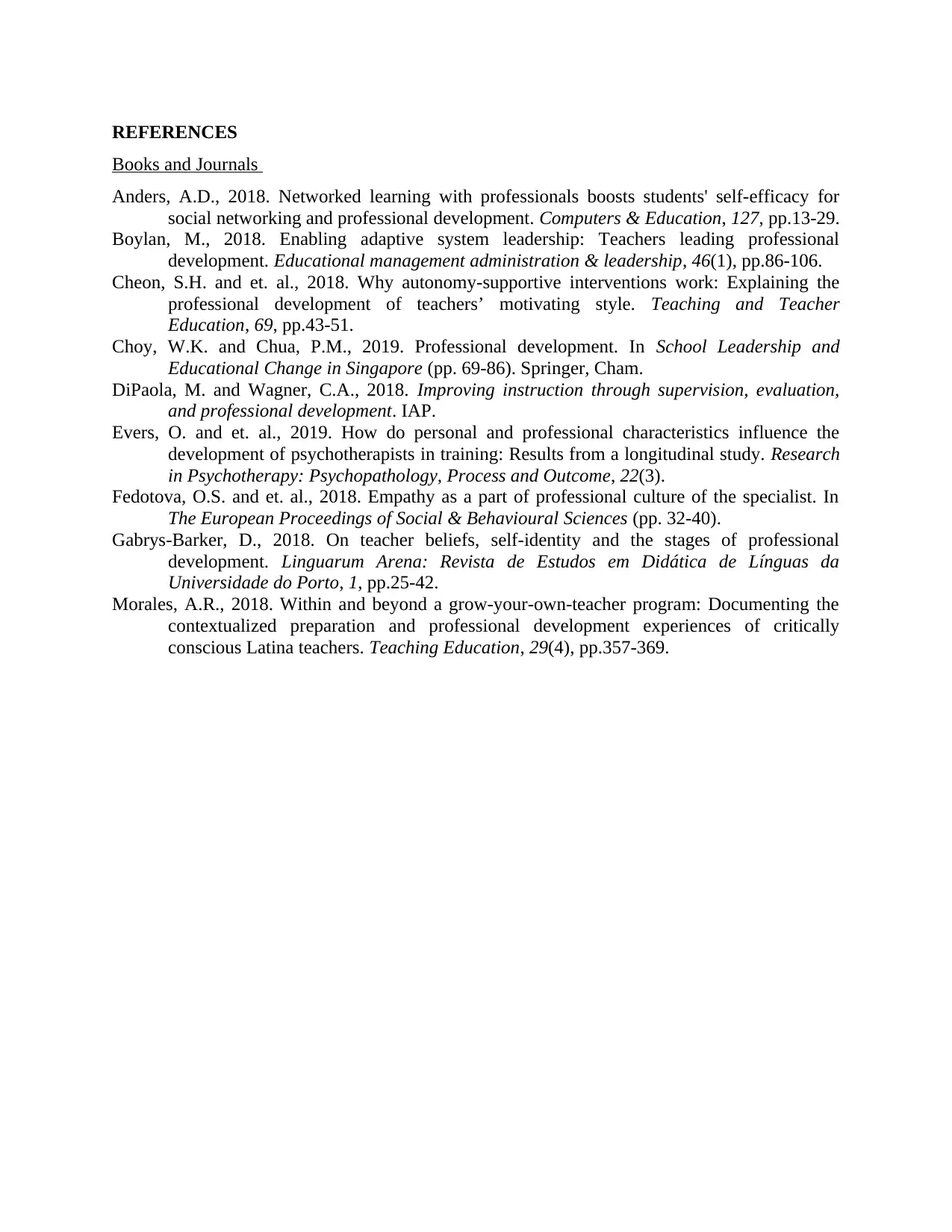
REFERENCES
Books and Journals
Anders, A.D., 2018. Networked learning with professionals boosts students' self-efficacy for
social networking and professional development. Computers & Education, 127, pp.13-29.
Boylan, M., 2018. Enabling adaptive system leadership: Teachers leading professional
development. Educational management administration & leadership, 46(1), pp.86-106.
Cheon, S.H. and et. al., 2018. Why autonomy-supportive interventions work: Explaining the
professional development of teachers’ motivating style. Teaching and Teacher
Education, 69, pp.43-51.
Choy, W.K. and Chua, P.M., 2019. Professional development. In School Leadership and
Educational Change in Singapore (pp. 69-86). Springer, Cham.
DiPaola, M. and Wagner, C.A., 2018. Improving instruction through supervision, evaluation,
and professional development. IAP.
Evers, O. and et. al., 2019. How do personal and professional characteristics influence the
development of psychotherapists in training: Results from a longitudinal study. Research
in Psychotherapy: Psychopathology, Process and Outcome, 22(3).
Fedotova, O.S. and et. al., 2018. Empathy as a part of professional culture of the specialist. In
The European Proceedings of Social & Behavioural Sciences (pp. 32-40).
Gabrys-Barker, D., 2018. On teacher beliefs, self-identity and the stages of professional
development. Linguarum Arena: Revista de Estudos em Didática de Línguas da
Universidade do Porto, 1, pp.25-42.
Morales, A.R., 2018. Within and beyond a grow-your-own-teacher program: Documenting the
contextualized preparation and professional development experiences of critically
conscious Latina teachers. Teaching Education, 29(4), pp.357-369.
Books and Journals
Anders, A.D., 2018. Networked learning with professionals boosts students' self-efficacy for
social networking and professional development. Computers & Education, 127, pp.13-29.
Boylan, M., 2018. Enabling adaptive system leadership: Teachers leading professional
development. Educational management administration & leadership, 46(1), pp.86-106.
Cheon, S.H. and et. al., 2018. Why autonomy-supportive interventions work: Explaining the
professional development of teachers’ motivating style. Teaching and Teacher
Education, 69, pp.43-51.
Choy, W.K. and Chua, P.M., 2019. Professional development. In School Leadership and
Educational Change in Singapore (pp. 69-86). Springer, Cham.
DiPaola, M. and Wagner, C.A., 2018. Improving instruction through supervision, evaluation,
and professional development. IAP.
Evers, O. and et. al., 2019. How do personal and professional characteristics influence the
development of psychotherapists in training: Results from a longitudinal study. Research
in Psychotherapy: Psychopathology, Process and Outcome, 22(3).
Fedotova, O.S. and et. al., 2018. Empathy as a part of professional culture of the specialist. In
The European Proceedings of Social & Behavioural Sciences (pp. 32-40).
Gabrys-Barker, D., 2018. On teacher beliefs, self-identity and the stages of professional
development. Linguarum Arena: Revista de Estudos em Didática de Línguas da
Universidade do Porto, 1, pp.25-42.
Morales, A.R., 2018. Within and beyond a grow-your-own-teacher program: Documenting the
contextualized preparation and professional development experiences of critically
conscious Latina teachers. Teaching Education, 29(4), pp.357-369.
⊘ This is a preview!⊘
Do you want full access?
Subscribe today to unlock all pages.

Trusted by 1+ million students worldwide
1 out of 9
Related Documents
Your All-in-One AI-Powered Toolkit for Academic Success.
+13062052269
info@desklib.com
Available 24*7 on WhatsApp / Email
![[object Object]](/_next/static/media/star-bottom.7253800d.svg)
Unlock your academic potential
Copyright © 2020–2025 A2Z Services. All Rights Reserved. Developed and managed by ZUCOL.





